North Carolina native Jasmine Alston had never traveled outside the United States before she seized a summer opportunity to work in an animal science lab in Japan. Now the animal science major in NC State University’s College of Agriculture and Life Sciences plans to explore graduate research opportunities abroad.
A lover of furry friends and a fan of animal science documentaries, Alston grew up dreaming of becoming a veterinarian. A middle school teacher encouraged her to apply to NC State.
During her first year of college, Alston’s focus shifted from clinical work to animal science research, with plans to attend graduate school. After receiving an email about CALS study abroad programs, she applied. Nagoya University’s Department of Animal Sciences, in Japan, was seeking an undergraduate research assistant to help study the effects of low estrogen levels on kisspeptin, a hormone related to reproductive function in mammals.
Alston had taken animal reproduction classes through CALS’ Department of Animal Sciences, and her familiarity with the emerging research made her the perfect fit.
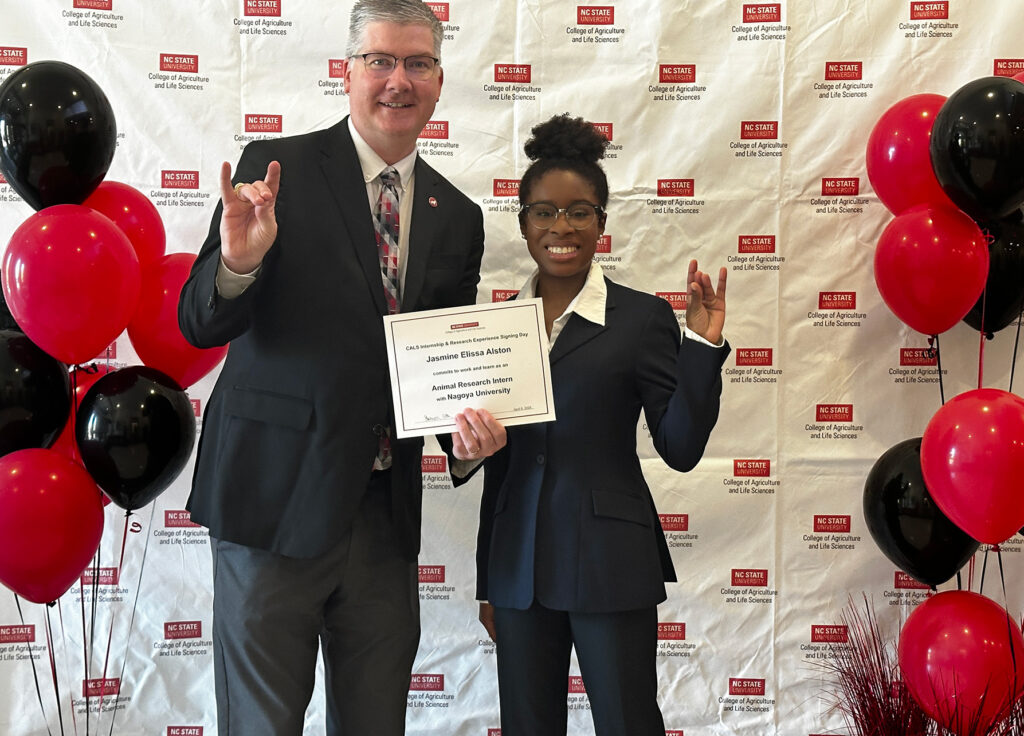 Alston smiles with Garey A. Fox, dean of the College of Agriculture and Life Sciences, at the first annual Internship and Research Experience Signing Day in April. This event recognized CALS students for securing summer internships and research opportunities.
Alston smiles with Garey A. Fox, dean of the College of Agriculture and Life Sciences, at the first annual Internship and Research Experience Signing Day in April. This event recognized CALS students for securing summer internships and research opportunities.
Studying the Effects of Low Estrogen on Reproduction
Under the supervision of Associate Professor Naoko Inoue, Alston worked as an animal research intern in the Graduate School of Bioagricultural Sciences’ animal reproduction laboratory, studying the effects of low estrogen levels on kisspeptin.
Kisspeptin is a protein produced in the hypothalamus that plays a vital role in reproduction. Research in rodent models could be key to developing human therapies to ease or even minimize the effects of menopause in women.
The research group found that kisspeptin neurons don’t fire as often when estrogen levels are low. These neurons are part of a feedback loop that balances key reproductive hormones. But with low estrogen, the loop slows down.
Alston observed fewer signals than when estrogen was high. “We assumed there would be some firing back and forth, even if nothing was really happening,” but that wasn’t the case. The neurons actually lost firing power.
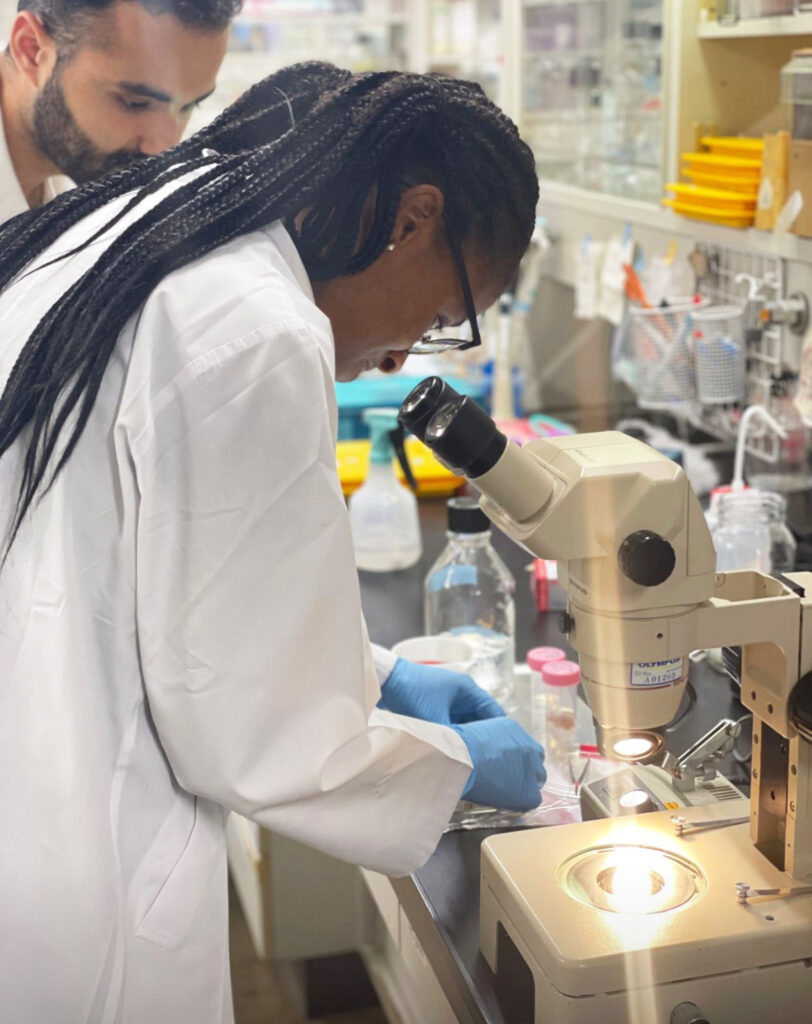 Alston and doctoral student Hazim Safiullah work with brain tissue samples in Nagoya University’s animal reproduction laboratory.
Alston and doctoral student Hazim Safiullah work with brain tissue samples in Nagoya University’s animal reproduction laboratory.
The research group’s study suggests that low estrogen makes kisspeptin neurons less active, disrupting hormone regulation and reducing estrogen production.
“Decreased estrogen production can lead to loss of muscle mass and bone density deterioration, problems that menopausal women experience,” Alston says.
Though a natural part of the aging process and, thus, not preventable, the research team suspects that the slow-firing kisspeptin neurons can be reactivated.
“We don’t know how to do that yet,” Alston says. “We need future studies to develop medications that will switch on the regulatory functions of the neurons, so that menopause symptoms aren’t as harsh.”
Building Skills in the Lab and Beyond
CALS classes prepared Alston for the rigors of research in the animal reproduction lab. The Reproductive Physiology course (ANS 220) enhanced her practical, hands-on lab work, giving her an academic advantage typical of Nagoya’s graduate students.
Although she had no experience working with rats, her Equine Breeding Farm Management (ANS 410) coursework gave her the physiological knowledge to handle rodents and properly take their blood samples.
She also developed strong communication skills, learning to present research at the graduate and professional levels. In the lab, she gained experience in rodent care and surgical procedures, including ovary removals to lower estrogen levels in rats and tissue sample preparation.
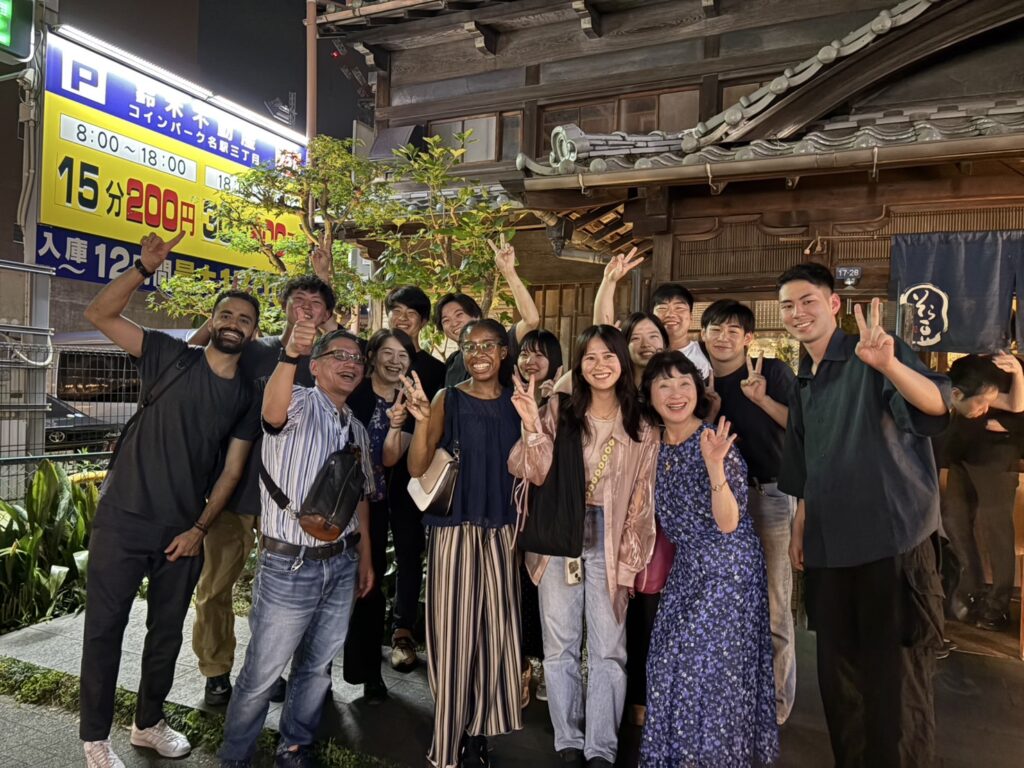 Students and professors from the animal reproductive laboratory team celebrated Alston’s arrival at a restaurant in Japan.
Students and professors from the animal reproductive laboratory team celebrated Alston’s arrival at a restaurant in Japan.
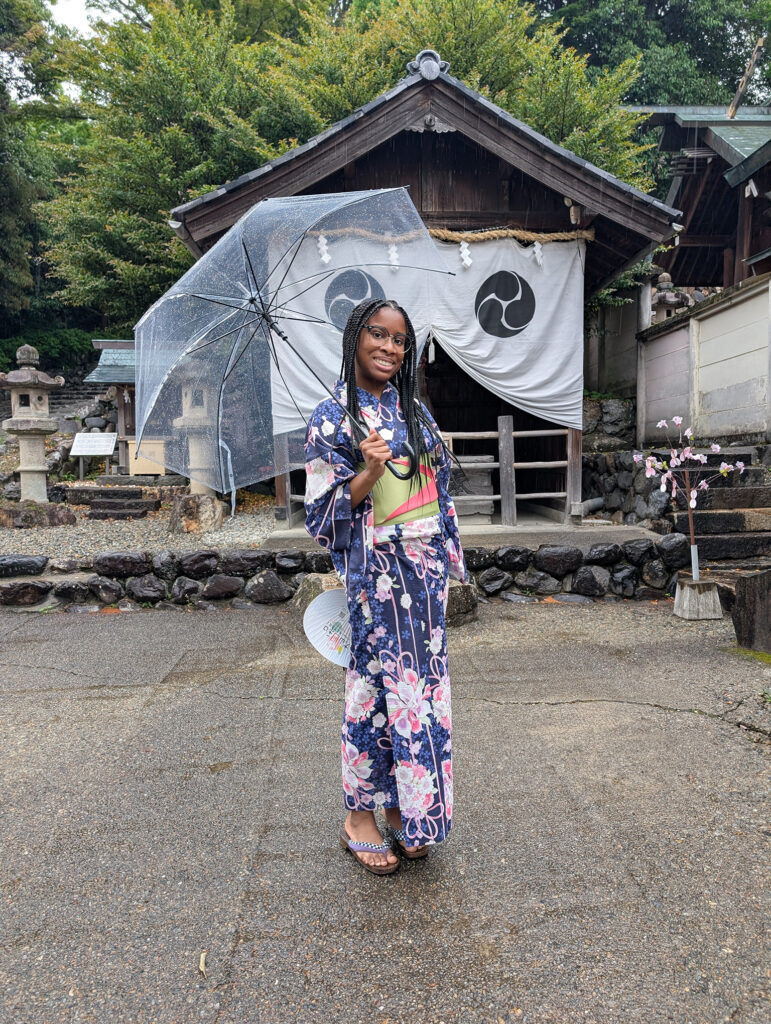 Dressed in a kimono, Alston explores Japanese culture while visiting the Inuyama Castle.
Dressed in a kimono, Alston explores Japanese culture while visiting the Inuyama Castle.
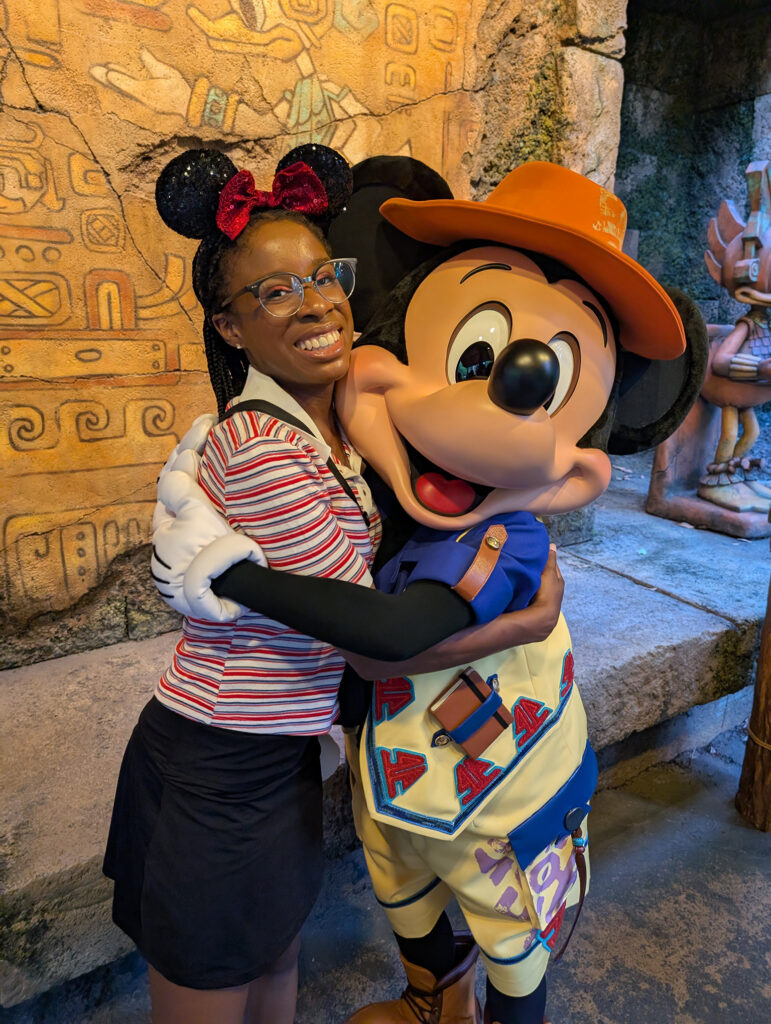 Alston enjoys Tokyo DisneySea thanks to the flexible research hours.
Alston enjoys Tokyo DisneySea thanks to the flexible research hours.
Alston’s internship has ignited a desire to pursue further education. After she graduates in May 2026, she plans to apply to Nagoya University’s graduate program for animal science reproduction.
“I learned skills that I never thought I would learn as an undergraduate or graduate student,” she says. “I want to push myself more now that I can handle this level of research.”
Related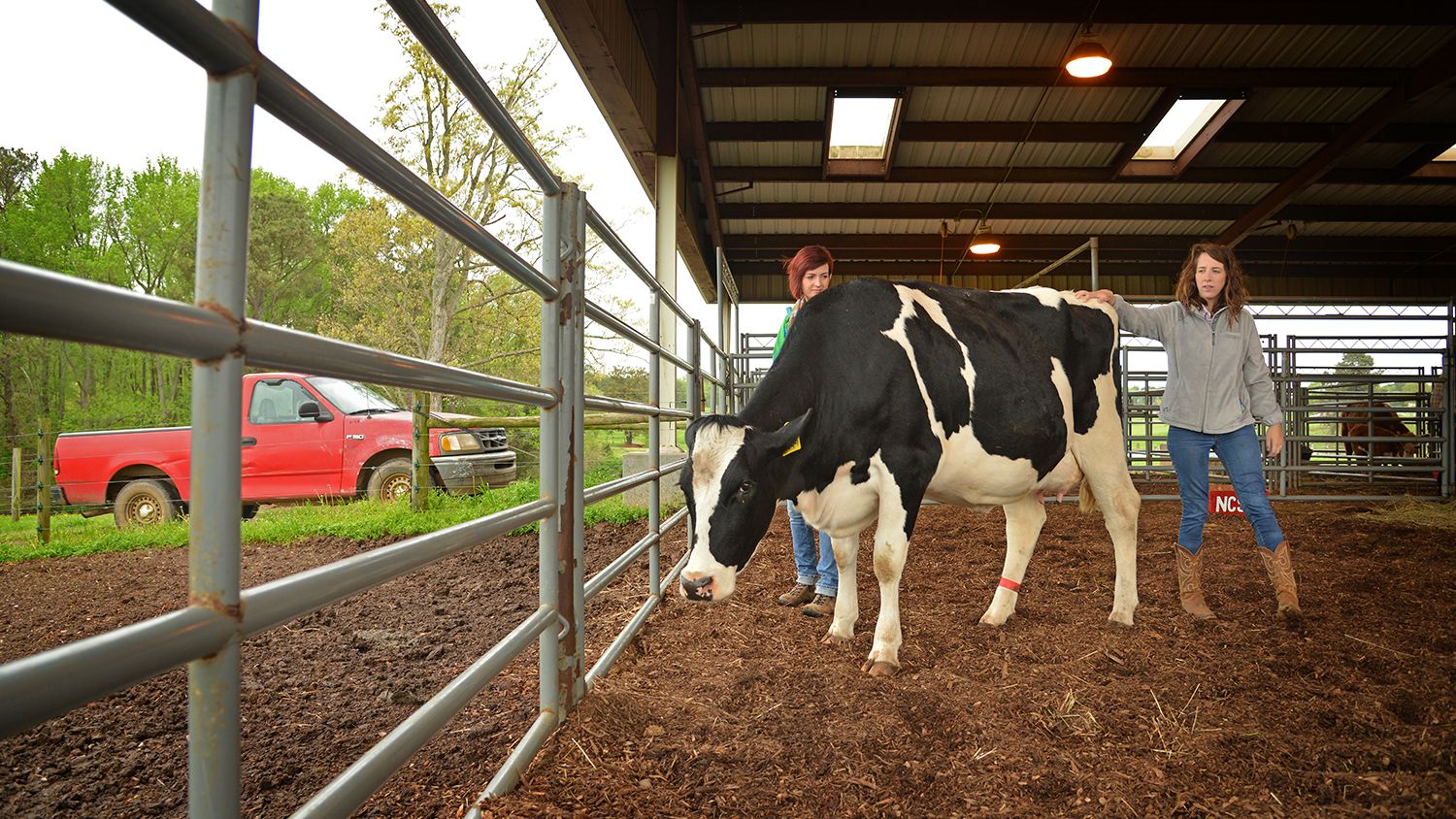 Working with Creatures Great and Small
Working with Creatures Great and Small
Explore the Field of Animal Science


AloJapan.com